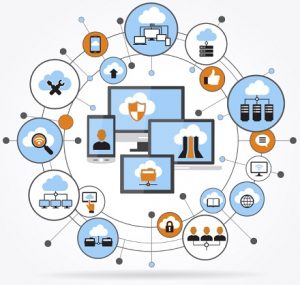Growing businesses need ERP
 Size really isn’t everything when it comes to ERP. A great ERP solution will be tailored to suit the specifics of a business so it can integrate its processes and individual departments and add value, consistency and that coveted propensity for growth. Crucially, all this is irrespective of the scale or geographical reach of the organisation.
Size really isn’t everything when it comes to ERP. A great ERP solution will be tailored to suit the specifics of a business so it can integrate its processes and individual departments and add value, consistency and that coveted propensity for growth. Crucially, all this is irrespective of the scale or geographical reach of the organisation.
Our economic system engenders corporate growth. It’s essential for achieving and maintaining a competitive edge, increasing market value and sustaining investment capital and resources. But, hitting a steady, manageable growth trajectory isn’t just dependent on economies of scale and revenue generation – it’s about being sufficiently well positioned to identify opportunities and strengthen business performance in line with a sound business growth strategy.
ERP answers this call on every level. By investing in a multi-functional ERP platform you’ll ensure your company’s efficiency, productivity and agility remains optimised, which will fuel your journey towards the growth you’ve planned for.
If you’re still unsure whether ERP could be the strategic saviour for you, it’s worth checking your organisation’s vital signs to see if you even have a choice but to act.
The telltale signs you need to implement an ERP solution now…
Your finance department is flagging
 Paper invoices, printed spreadsheets, manual reconciliations and separate accounts and sales systems all take hours to process – and that’s without the time spent consolidating records in readiness for your monthly financial reporting.
Paper invoices, printed spreadsheets, manual reconciliations and separate accounts and sales systems all take hours to process – and that’s without the time spent consolidating records in readiness for your monthly financial reporting.
This is where ERP excels – pardon the pun.
You’ll eliminate any cross-posting and rekeying required and all of those manual reconciliations you used to have to do from the off. Plus you will have instant access to all your financials on a single database that will give you more hard and fast reports than you can shake a red pen at. Moreover, your accounts team will be free to work with newly invigorated productivity on one harmonised system without the frustration of the archaic methods of old.
You don’t have instant access to business intelligence
If you don’t have ready access to business-critical information – from average sales margins to key performance metrics – your ability to project, forecast and plan will be seriously impeded at best. Data silos with information spread over disparate systems and manually controlled spreadsheets can result in hours spent gathering the intelligence you need; that’s time you don’t have in a fast-paced business environment.
ERP is designed to empower you with actionable insights that give your organisation’s executives a consistently clear and uniquely holistic view of your operations. Then there are the business analytics and unified data that give your departments the information they need to identify new opportunities, deliver a more tailored customer service and forecast with unparalleled accuracy – fast.
You have too many software systems
 Your finance department runs its own cloud-based accounts system, your inventory and supply chain are tracked on an on-premise solution, your customer service depends on a CRM platform while your sales team relies on legacy sales software – which may or may not integrate with your CRM. Sound familiar?
Your finance department runs its own cloud-based accounts system, your inventory and supply chain are tracked on an on-premise solution, your customer service depends on a CRM platform while your sales team relies on legacy sales software – which may or may not integrate with your CRM. Sound familiar?
The real beauty of ERP lies in its powers of integration. A unified ERP application will integrate every department, every business function, and every process. It eliminates the risk of misleading sales data, poor inventory management and unreliable reporting that can lead to an accounting nightmare. Having a single source of accurate, real-time data means informed decision-making and more time to plan for the growth you want.
Your IT department is costing you time and expense
The consequence of relying on multiple software systems that govern myriad processes is that your IT department is likely to be fraught with complexity and a drain on your human resources, not to mention your budget. Managing each system, implementing time-consuming and costly updates and patches, and missing critical upgrades may well be tech troubles too far.
ERP technologies, notably cloud-based ERP software platforms, eradicate the risk of missed updates and ineffective functions and ensure you have the tools to enhance and harmonise your system as your business evolves and grows.
Your customer service is lax
Failing to deliver the experience you promised your customers is tantamount to neglect, and is never going to end well. When your inventory, sales and customer information is held on disparate systems, managing your product flow will inhibit your ability to satisfy both your orders and your customers. It’s one thing when inventory is depleted and sales are delayed; when customer enquiries about their order lead to tracking confusion and delivery disarray, it’s another. Your reliability will soon be as compromised as your reputation.
ERP means everyone has access to the real-time information they need to deliver a sterling customer experience. When stock needs to be replenished the warehouse manager will know, when questions about orders, tracking and payments are asked by the customer, the answers are there and so on. With secure customer portals, a quick log in to an online account will streamline your service further still.
If any of these scenarios ring true to you and evolution is on your agenda, ERP could do more than propel your growth trajectory – it might just save your business.
How an ERP implementation can engender business growth
 Whether you’re a business start-up or a few years along the line, if you’re growing you have no option but to cover all bases and invest today in the future you see for your business. The foundation to scale for growth is borne out of operational efficiency and compromising that while on your journey to expansion will undoubtedly prove problematic. Indeed, as your business begins to grow, the key challenge is to keep all your processes, products and people in check and working coherently.
Whether you’re a business start-up or a few years along the line, if you’re growing you have no option but to cover all bases and invest today in the future you see for your business. The foundation to scale for growth is borne out of operational efficiency and compromising that while on your journey to expansion will undoubtedly prove problematic. Indeed, as your business begins to grow, the key challenge is to keep all your processes, products and people in check and working coherently.
An unified ERP application acts as a three-dimensional platform that will integrate your departments. This enables effective collaboration using up-to-the-minute, single source data, perform smarter with more agile workflow cycles, improve productivity, cut costs and, crucially, position your entire organisation perfectly for growth.
Choosing the ERP platform that’s right for you will mean you’ll deploy a solution from the off that’s tailored to suit your business specifically. However, since we’re talking growth, it’s critical your solution of choice is robust and flexible enough to accommodate change and sufficiently scalable to evolve with you when the time comes.
Appoint an ERP partner to be with you as you evolve and grow
 With so much at stake, partnering with an ERP implementation consultant who has expertise in your market sector and speaks your language is vital. Naturally, you’ll want to be confident you’re adopting the most suitable ERP platform for your business and that it will help you set about the transformative change and growth you seek. But more than that, you’ll be looking to embark on a relationship that will take you into a new era of operational efficiency and control and support you every step of the way.
With so much at stake, partnering with an ERP implementation consultant who has expertise in your market sector and speaks your language is vital. Naturally, you’ll want to be confident you’re adopting the most suitable ERP platform for your business and that it will help you set about the transformative change and growth you seek. But more than that, you’ll be looking to embark on a relationship that will take you into a new era of operational efficiency and control and support you every step of the way.
Since steady, sustained growth is your key requisite, your ERP implementation partner will be likely to recommend industry-leading ERP software solutions like Microsoft Dynamics NAV and Microsoft Dynamics 365 Business Central. Both are end-end-end platforms that are designed to seize on the potential and aspirations of small and medium-sized businesses. They deliver unrivalled control over financial and business data, with a suite of collaborative sales and management features and a welcome promise that you can implement and start quickly and scale up with new complexities and functionalities when your business strategy allows.
Throughout your Microsoft Dynamics ERP journey you’ll have the support of a Microsoft Gold Partner who’ll work hand-in-hand with you to analyse your business environment, transfer knowledge and set the milestones, timescales and objectives you’re comfortable with. When your implementation is complete and your new system live, you’ll be thankful for the continued support of a proven, credible partner who’ll be with you for the long haul and ready to eliminate the growing pains you might otherwise have experienced.
Both Dynamics NAV and Dynamics 365 Business Central offer a range of plans that are designed to fit business models on a refreshingly low TCO (total cost of ownership) and, thanks to its flexibility, offer an impressive return on investment. These are platforms that are built on a foundation of universally trusted technologies that serve 160,000 customers and millions of users around the world; when growth is on the business agenda, finding an ERP solution to rival such a weighty potential for commercial transformation will be no mean feat.
If you business is on the up or you’re planning for it to be moving in that direction, your first step should be to talk to a trusted ERP implementation partner who’ll align with and enhance your business growth strategy while keeping your investment in safe hands. Get in touch with the TVision team.

